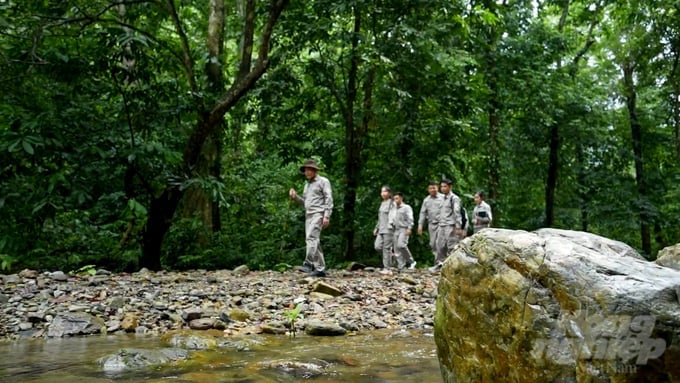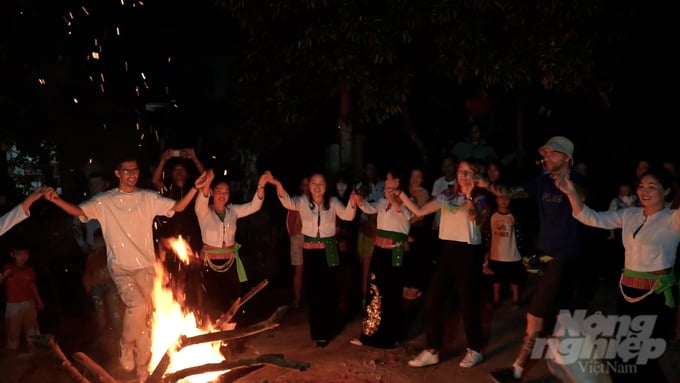June 19, 2025 | 06:49 GMT +7
June 19, 2025 | 06:49 GMT +7
Hotline: 0913.378.918
June 19, 2025 | 06:49 GMT +7
Hotline: 0913.378.918

Connectivity in transportation stands as a significant barrier that limits the number of returning visitors to Xuan Son National Park (Phu Tho). Photo: Quang Dung.
Xuan Son National Park is the only national park with a primary forest on a typical limestone mountain in northern Vietnam. The park boasts a rich and diverse ecosystem with 365 animal species and 726 vascular plant species. Visitors to the park will have the opportunity to fully explore the local ecosystem, including limestone mountains, caves, waterfalls, rivers, and streams.
Additionally, the core area of Xuan Son National Park is home to two ethnic communities, the Dao and Muong. These communities have been able to maintain their cultural identities, which range from clothing articles, festivals to daily life activities, along with various unique specialty dishes such as multi-spur chicken, five-colored sticky rice, bamboo-tube rice, and sour meat.
However, Xuan Son National Park faces numerous barriers in the development of tourism under the forest canopy. Tran Ngoc Cuong, Director of Xuan Son National Park, highlighted the first challenge as the incomplete mechanisms and policies for national parks in Vietnam. Furthermore, connectivity in transportation stands as a significant barrier that limits the number of returning visitors to Xuan Son National Park.
"Another barrier is the lack of professional training for local residents and community-based tourism providers, resulting in subpar service quality for tourists. Additionally, local homestay accommodations are evolving towards modern-styled facilities, similar to those found in the lowlands. This development trend can deteriorate the ethnic identity of the local communities in Xuan Son National Park," Director Tran Ngoc Cuong added.
Regarding concerns over local tourism development, Ha Thi Yen, Chairwoman of the Xuan Son Commune People's Committee (located in the core area of Xuan Son National Park), commented that the primary tourist seasons typically last from March to September, particularly during holidays. Consequently, the influx of visitors results in overcrowding at local homestay accommodations, thereby impacting service quality. Additionally, the lack of environmental consciousness in tourists often exacerbates local waste management efforts.

Xuan Son National Park receives a considerable number of foreign tourists. Photo: Quang Dung.
Deputy Prime Minister Tran Luu Quang recently issued Decree No. 91/2024/ND-CP on July 18, 2024, amending and supplementing several provisions under Decree No. 156/2018/ND-CP dated November 16, 2018, detailing the implementation of several articles under the Law on Forestry. Accordingly, one of the adjustments to the Decree is the amendment and supplementation of Article 14, which stipulates the construction, appraisal, approval, and implementation of ecotourism, resort, and recreational projects in special-use forests.
Subsequently, Director Tran Ngoc Cuong expects the new decree to provide a fundamental solution for enhancing the park's tourism potential. Additionally, Director Cuong anticipates that the park's project will receive approval in the near future, which will encourage businesses to collaborate in exploiting tourism and promoting the sustainable development of Xuan Son and other national parks.
Furthermore, stakeholders must shift their attention towards the implementation of agricultural extension models and promotion of local agricultural products' value. They should focus on the model of cultivating medicinal plants under the forest canopy and developing specialty crops and livestock to supply tourists.
"We plan to implement a forest carbon credit storage initiative in the near future, with support from forest environmental services. Consequently, this initiative will provide the local community with additional employment opportunities and income. In return, the community will be motivated to protect the green forests as their own homes," shared Director Tran Ngoc Cuong.
The National Park Passport initiative acts as a bridge that connects responsibilities and benefits among stakeholders. In addition to exploring forest values, visitors are encouraged to "experience" competition, share personal stories, and promote these interactions within the community.
Initially implemented across 34 national parks, the National Park Passport can be obtained in either physical or electronic formats. Visitors can stamp their paper passports upon entry or via an application at each new national park. Personal impressions and evaluations are also recorded within the passport system.
The National Park Passport initiative has been implemented across many countries around the world, with the goal of enhancing environmental awareness, promoting cultural education, boosting tourism activities, and generating sustainable income for designated forest areas.
Translated by Nguyen Hai Long

(VAN) After 5 years of implementation, the CAI initiative has helped coffee growers change their farming practices, moving toward responsible agriculture that meets global export standards.

(VAN) The primary prerequisite for the comprehensive and robust integration of Vietnam's livestock sector into the global value chain is the establishment of a disease control system.

(VAN) The results of national programs are essential for establishing a contemporary livestock sector that is well-equipped to meet the demands of both domestic and international markets, with robust biosafety standards.

(VAN) The UNESCO Global Geopark revalidation of Non nuoc Cao Bang and the transition to a two-tier administrative model are presently undergoing a pivotal moment in Cao Bang, the northernmost province of Vietnam.
/2025/06/13/5330-2-004539_953.jpg)
(VAN) Changing policy mindset and removing investment barriers are urgent requirements to open up new development space for enterprises in the agricultural sector.

(VAN) The areas include the restoration of five million hectares of marine ecosystems.

(VAN) Dr. Le Van Nguyen, Director of the Institute of E-Commerce Management (ECM), emphasizes the potential for green development through the cultivation of fruit trees, particularly in provinces such as Son La.